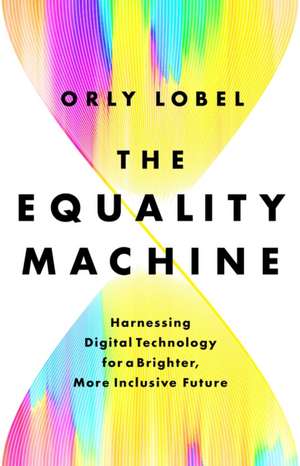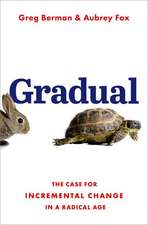The Equality Machine
Autor Orly Lobelen Limba Engleză Hardback – 17 oct 2022
With provocative insights in every chapter, Lobel masterfully shows that digital technology frequently has a comparative advantage over humans in detecting discrimination, correcting historical exclusions, subverting long-standing stereotypes, and addressing the world's thorniest problems: climate, poverty, injustice, literacy, accessibility, speech, health, and safety.
Lobel's vivid examples-from labor markets to dating markets-provide powerful evidence for how we can harness technology for good. The book's incisive analysis and masterful storytelling will change the debate about technology and restore human agency over our values.
Preț: 121.57 lei
Preț vechi: 168.43 lei
-28% Nou
23.26€ • 24.14$ • 19.45£
Carte disponibilă
Livrare economică 24 februarie-10 martie
Livrare express 07-13 februarie pentru 82.10 lei
Specificații
ISBN-10: 1541774752
Pagini: 368
Ilustrații: 2 equations
Dimensiuni: 158 x 238 x 38 mm
Greutate: 0.58 kg
Editura: Hachette Book Group
Colecția PublicAffairs
Notă biografică
Orly Lobel is an award-winning author and the Warren Distinguished Professor of Law at the University of San Diego. She is the Director of the Program of Employment and Labor Law as well as the founding faculty of the Center for Intellectual Property and Markets. She is the author of two previous books, You Don't Own Me: How Mattel Vs. MGA Entertainment Exposed Barbie's Dark Side, which was reviewed by Jill Lepore in The New Yorker and has been optioned for film, and Talent Wants to Be Free: Why We Should Learn to Love Leaks, Raids, and Free Riding. Lobel's books and work have been written about in The Economist, BusinessWeek, The Wall Street Journal, Forbes, Fortune, Financial Times, Globe and Mail, NPR's "Marketplace," CNBC, and CNN Money.
Descriere
Much has been written about the challenges tech presents to equality and democracy. But we can either criticize big data and automation or steer it to do better. Lobel makes a compelling argument that while we cannot stop technological development, we can direct its course according to our most fundamental values.
With provocative insights in every chapter, Lobel masterfully shows that digital technology frequently has a comparative advantage over humans in detecting discrimination, correcting historical exclusions, subverting long-standing stereotypes, and addressing the world's thorniest problems: climate, poverty, injustice, literacy, accessibility, speech, health, and safety.
Lobel's vivid examples-from labor markets to dating markets-provide powerful evidence for how we can harness technology for good. The book's incisive analysis and masterful storytelling will change the debate about technology and restore human agency over our values.


